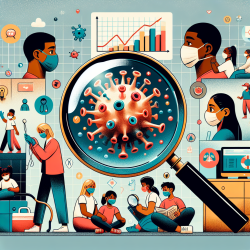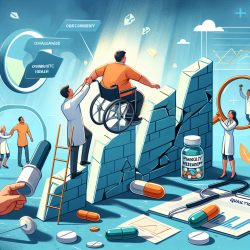Introduction
In the ever-evolving field of speech-language pathology, particularly within the realm of online therapy services like those provided by TinyEYE, it is crucial to integrate findings from diverse research areas to enhance service delivery and outcomes. One such area is the field of toxicology, specifically in the context of drug-impaired driving and motor vehicle fatalities. The 2021 update of the "Recommendations for Toxicological Investigation of Drug-Impaired Driving and Motor Vehicle Fatalities" provides valuable insights that can be translated into improving therapeutic practices and outcomes for children.
Understanding the Research
The research article outlines updates to the National Safety Council’s recommendations for drug testing in cases of driving under the influence of drugs (DUID) and motor vehicle fatalities. These updates are based on a comprehensive survey of drug testing practices across laboratories in the USA and Canada. The consensus panel concluded that urine is an inferior matrix compared to blood and oral fluid for detecting drug impairment. This insight underscores the importance of using accurate and relevant data to inform decisions, a principle that is equally applicable in speech-language pathology.
Implementing Data-Driven Decisions in Therapy
Just as toxicology labs are encouraged to use blood and oral fluid for accurate drug testing, speech-language pathologists should utilize data-driven approaches to tailor therapy to each child's unique needs. Here are some strategies to integrate these principles:
- Assessment and Monitoring: Use evidence-based assessments to gather accurate data on a child's communication abilities. Regularly monitor progress with reliable tools to ensure that therapy is effective and adjust strategies as needed.
- Personalized Therapy Plans: Develop individualized therapy plans based on data collected during assessments. This ensures that therapy targets are relevant and achievable, leading to better outcomes.
- Collaboration and Communication: Work closely with families and other professionals to gather comprehensive data about the child's environment and needs. This holistic approach can provide insights similar to those gained from using multiple matrices in toxicology testing.
Encouraging Further Research
The field of speech-language pathology can benefit from ongoing research and collaboration with other disciplines. Practitioners are encouraged to stay informed about the latest research findings and consider how they can be applied to improve therapy outcomes. Engaging in interdisciplinary research can lead to innovative approaches and enhanced services for children.
Conclusion
By adopting a data-driven approach similar to that recommended in the toxicological investigation of drug-impaired driving, speech-language pathologists can enhance the effectiveness of online therapy services. This approach not only improves outcomes for children but also advances the field as a whole. To read the original research paper, please follow this link: Recommendations for Toxicological Investigation of Drug-Impaired Driving and Motor Vehicle Fatalities—2021 Update.










